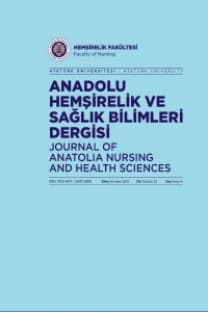Bir Üniversite hastanesinde çalışan hemşirelerin profesyonel benlik gelişim düzeyleri ve etkileyen faktörler
The professional self development levels and affecting factors of nurses working in A University hospital
___
- Adams K, Hean S, Sturgis P, Clark JM. Investigating The Factors İnfluencing The Professional İdentify of First-Year Health and Social Science Students. Learning in Health and Social Care 2006;5(2):55-68.
- Arthur D, Thorne S. Professional Self-Concept of Nurses: A Comparative Study of Four Strata of Nursing Students in a Canadian University. Nurse Education Today 1998;18(5):380-88.
- Arthur D, Sohng KY, Noh CH, Kim S. The Professional Self Concept of Korean Hospital Nurses. İnternational Journal of Nursing Studies 1999;35 (3):155-62.
- Costello CY. Changing Clothes: Gender Inequality and Professional Socialization. National Women’s Studies Association Journal 2004;16(2):138-55.
- Cowin LS, Maree J, Rhonda GC, Herbert WM. Causal modeling of self-concept, job satisfaction, and retention of nurses. International Journal of Nursing Studies 2008;45(10):14-49.
- Deppoliti D. Exploration How New Registered Nurses Construct Professional İdentity in Hospital Settings. The Journal of Continuing Education in Nursing 2008;39(6):255-62.
- Fagermoen S. Professional İdentity: Values Embedded İn Meaningful Nursing Practice.JAN 1997;25(3):434-41.
- Fletcher K. Image: Changing How Women Nurses Think About Themselves. Literature review. JAN 2007;58(3):207-15.
- Gregg MF, Magilvy JK. Professional İdentity Of Japanese Nurses: Bonding İnto Nursing. Nursing&Health Sciences 2001;3(1):47-55.
- Hendel T, Kagan I. Professional İmage And İntention To Emigrate Among Israeli Nurses And Nursing Students. Nurse Educ Today 2010; doi:10.1016/j.nedt.2010.11.008
- Heung YYJ, Frances Wonng KY, Enid Kwong WY, Tany To SS, Daniel Wong HC. Severe Acute Respiratory Syndrome Outbreak Promotes a Strong Sense of Professional İdentity Among Nursing Students. Nurse Educ Today 2005;25(2):112-8.
- Hisar F, Karadağ, A. Determining The Professional Behaviour Of Nurse Executives. International Journal of Nursing Practice 2010;16(4):335-41.
- Hwang IJ, F Lou SS, Han FCao, WO, Kim, P Li. Professionalism: The Major Factor İnfluencing Job Satisfaction Among Korean and Chinese Nurses. International Nursing Review 2009;56(3):313–8.
- Karadağ G, Sertbaş G, Güner İC, Taşdemir HS, Özdemir N. Hemşirelerin İş Doyumu ve Tükenmişlik Düzeyleri İle Bunları Etkileyen Bazı Değişkenlerin İncelenmesi. Hemşirelik Forum Dergisi 2002;5(6):8- 15.
- Karadağ A, Hisar F, Elbaş NÖ. Hemşirelikte Profesyonelliğe İlişkin Davranışsal Envanter. Hemşirelik Forum Dergisi 2004;7(4):14-22.
- Karadağ A, Hisar F, Elbaş NÖ. The Level of Professionalism Among Nurses in Turkey. Journal of Nursing Scholarship 2007;39(4):371–4.
- Kaya K, Şimşek Z, Kabalcıoğlu F, Dayı FF. Hemşirelerin Mesleki İmajlarını ve Mesleği Algılamalarını Etkileyen Faktörler. Hemşirelik Forum Dergisi 2004;7(1):1-6.
- Kelleci M, Gölbaşı Z. Bir Üniversite Hastanesinde Çalışan Hemşirelerin Problem Çözme Becerilerinin Bazı Değişkenler Açısından İncelenmesi. Cumhuriyet Üniversitesi Hemşirelik Yüksek Okulu Dergisi 2004;8 (2):1-8.
- Kelleci M, Gölbaşı Z, Yılmaz M, Doğan S. Hemşirelerin Araştırma Yapma ve Araştırma Sonuçlarını Bakımda Kullanma İle İlgili Görüşlerinin İncelenmesi. Hemşirelikte Araştırma Geliştirme Dergisi 2008;10(2):1-16.
- Kelly S, Courts N. The Professional Self-Concept of New Graduate Nurses. Nurse Education in Practice 2007;7(5):332–7.
- Kım-Godwın YS, Baek HC, Wynd CA. Factors Influencıng Professıonalism in Nursing Among Korean American Registered Nurses. Journal of Professional Nursing 2010;26(4):242–9.
- McKenna LG, Gren C. Experiences and Learning During A Graduate Nurse Program; An Examination Using a Focus Group Approach. Nurse Education in Practice 2004;4(4):258-63.
- Öhlen J, Segesten K. The Professional İdentity of The Nurse: Concept Analysis and Development. Journal of Advanced Nursing 1998;28(4):720-7.
- Pilehvarzadeh M, Hossein Rezaei H, Salari S, Nikiyan Y. Evaluation of The Levels of Professional Self-Concept in the Nursing Staff of Kerman Medical Sciences University Hospital. Nursing and Midwifery 2003;11(3):57-60.
- Sabancıogulları S, Doğan S, Bircan H. Klinik Hemşireleri İçin Profesyonel Benlik Kavramı Ölçeği (HPBKÖ): Geliştirilmesi, Geçerlik ve Güvenirlik Çalışması. Turkiye Klinikleri J Nurs Sci 2011;3(1):16-28.
- Siebens K, Casterlé DB, Abraham I, Dierckx K, Braes T, Darras E et al. The Professional Self-İmage of Nurses in Belgian Hospitals: A Cross-Sectional Questionnaire Survey. İnternational Journal of Nursing Studies 2006;43(1):71-82.
- Strasen L. The İmage of Professional Nursing; Strategies for Action. 1 nd ed. London: J.B. Lippincott Company.1992. p.61-3.
- Vliegher K, Milisen K, Wouters R, Scheepmans K, Paquay L, Debaillie R. et al. The Professional Self- İmage of Registered Home Nurses in Flanders (Belgium): A Cross-Sectional Questionnaire Survey. Applied Nursing Research 2011;24(1):29–36.
- Weller L, Harrison M, Katz ZMA. Changes in the Self and Professional İmages of Student Nurses. Journal of Advanced Nursing 2006;13(2):179-84.
- ISSN: 1309-5471
- Yayın Aralığı: 4
- Yayıncı: Atatürk Üniversitesi Hemşirelik Fakültesi
STOMALI BİREYLERİN CİNSEL SORUNLARININ DEĞERLENDİRİLMESİNDE PLISSIT MODELİNİN KULLANIMI
Yaşlılara sağlık hizmetlerinin sunumunda tele-tıp kullanımı
Leyla ÖZDEMİR, Nurten KALENDER
Karaman ilindeki annelerin bebeklerinin bakımında uyguladıkları geleneksel yöntemler
Nejla CANBULAT, Fatma AYHAN, Asiye ARISOY
YAŞLILARA SAĞLIK HİZMETLERİNİN SUNUMUNDA TELE-TIP KULLANIMI
Nurten KALENDER, Leyla ÖZDEMİR
Selma SABANCIOĞULLARI, Selma DOĞAN
Erik von ELM, G. Douglas ALTMAN, J. Stuart POCOCK, C. Peter GØTZSCHE, P. Jan VANDENBROUCKE, Matthias EGGER, Zekiye KARAÇAM
ÇOCUK HASTALARDA BRADEN Q BASINÇ ÜLSERİ DEĞERLENDİRME ÖLÇEĞİ’NİN TÜRKÇE GEÇERLİLİK VE GÜVENİRLİĞİ
Nebahat BORA GÜNEŞ, Ebru KILIÇARSLAN TÖRÜNER
Sebahat GÖZÜM, Fatma GÜDÜCÜ TÜFEKCİ, Cantürk ÇAPIK
Selma SABANCIOĞULLARI, Selma DOĞAN
Ebelik öğrencilerinin sağlıklı yaşam biçimi davranışları ve etkileyen faktörler
